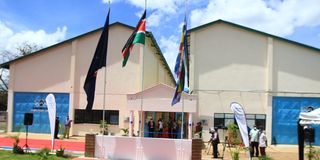Uhuru opens semiconductor chips factory in Nyeri

President Uhuru Kenyatta unveils a commemorative plaque to mark the official opening of the Semi-Conductors Technologies factory at Dedan Kimathi University of Technology's Science and Technology Park (DeST-Park) in Nyeri County, on April 26, 2021
Kenya has joined the league of countries manufacturing semiconductors, also known as system chips, which are used in smartphones, tablets and other electronics products.
Semiconductors are tiny chips that control the most critical functions of any electronic apparatus. Other countries that produce the chips are Thailand, South Korea, Japan and the US.
The device has been on high demand globally especially during the wake of the Covid-19 pandemic where most people are working from home and students are learning virtually, pushing the demand for smartphones, computers, and high-resolution screens.
A shortage of chips-loaded devices is in short supply globally, thereby pushing prices up.
On Monday, President Uhuru Kenyatta launched the Semiconductor Technologies plant at the Dedan Kimathi University of Technology (Dekut) in Nyeri.
Big Four agenda
It is the anchor project of the university's science and technology park.
The specialised facility, which is the only one of its kind in Africa, is a Public Private Partnership (PPP) between the university and the American nanotechnology firm 4Wave Inc.
Work will start this month and mass production is scheduled to start in the second half of the year.
President Kenyatta said such partnerships are in line with one of his government’s Big Four agenda, manufacturing, which is also prioritised in Vision 2030.

Semiconductor Technology CEO Anthony Githinji makes his remarks during the launch of the company at Dedan Kimathi University on April 26, 2021.
He added that with the opening of the factory, Kenya is exploiting the areas where it has some level of skills sufficient to mount a significant assault on other established countries.
“The intention is to transform Kenya from a consumer of such products to a producer. To begin seeing some of these projects come to fruition is not only exciting but is a foundation to Kenya becoming an industrialised country in the near future,” Mr Kenyatta said.
According to the president, the growth of manufacturing machinery output, and technological improvements will put Kenya’s manufacturing at the forefront of economic growth.
The CEO 4Wave Inc Anthony Githinji said with the emergence of advanced technology such as electric cars and 5-G phones which heavily rely on chips, the plant will help curb global shortage of semiconductors.
Science and technology projects
On its part, the university says it is collaborating with the firm in this manufacturing venture with the intention of supporting the national government’s policy that requires its Ministries, Departments and Agencies (MDAs) to purchase locally manufactured products, under the “Buy Kenya – Build Kenya” initiative.
Dekut has also recruited 20 of its masters students in Science and Engineering programmes with a focus on science and technology projects in the project.
According to Sam Wambugu, an informatics specialist, Kenyans should expect cars, phones, and other semiconductor-loaded devices to cost more.
“The appetite for semiconductors, also known as chips, has been on an upward trend owing to a worldwide spike in demand for smart electronics. Modern cars have dozens of chips to regulate engine temperatures, adjust seats, control lights, and stabilise suspension systems, among many other functions.

The Semiconductor Technology company at Dedan Kimathi University.
"Smart buildings with sensors for many automated functions, including temperature and lighting regulation, are hungry for semiconductors,” he wrote in the Sunday Nation.
At the same time, Mr Kenyatta inspected the expansion of the 84-km Kenol - Sagana - Marua Highway into a four-lane dual carriageway.
The project traverses Murang’a, Kirinyaga and Nyeri where mainly coffee, tea, potatoes, beans, maize and avocado are grown. It also cuts across a section of Machakos and Embu counties.
It is anticipated that improvement of the road will ease movement of goods from the Port of Mombasa to the Ethiopian capital Addis Ababa and vice versa.
It is also part of the Kenyan section of Trans-Africa Highway, TAH4 (Cairo to Capetown), through Nairobi on to Moyale.
The Sh14 billion project starts at Kenol town in Murang’a and traverses through the trading centres of Makutano, Sagana, and Karatina before terminating at Marua in Nyeri.
Besides shortening by half the time it takes from Nairobi to Nyeri and beyond, the dual carriageway is being billed to play a critical role in reducing the cost of transporting agricultural produce from the Mt Kenya region to markets in Thika and Nairobi.





